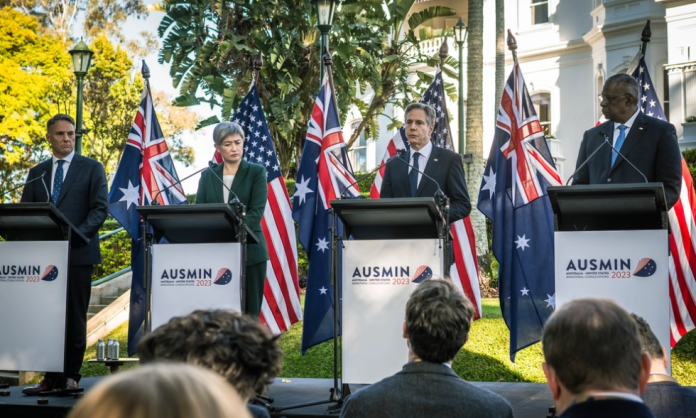First came the announcement last October that US Air Force bombers will operate out of the soon to be refurbished Tindal air base in the Northern Territory.
Then came the March revelation that the Australian military will in the next decade buy up to five US Virginia class nuclear-powered submarines before building its own British-designed nuclear-powered fleet using US technology.
Now, coming out of the annual Australia-United States Ministerial Consultations, known as AUSMIN and this year held in Brisbane, is the news that Australia will establish a guided weapons industry to supply the Americans with missiles, that two further air bases—Scherger in Queensland and Curtin in Western Australia—will be upgraded for US access, and that even more US military rotations will occur.
White House coordinator of Indo-Pacific affairs Kurt Campbell, speaking at a Center for Strategic and International Studies event in Washington last month, noted the “unprecedented” nature of Canberra’s commitment to the US military-industrial base, and to US strategic priorities “not just now, but ... into the distant future”.
As the Australian government and the ADF hierarchy clamour to turn this continent into US imperialism’s south-east Asian beachhead, from which war could be waged against China, solace at least can be taken from the fact that one is never too old for fairy tales.
Pat Conroy, minister for defence industry, says that the ALP’s blank cheque backing of US war preparations is “progressive policy”. In an interview with Guardian Australia’s foreign affairs correspondent Daniel Hurst, Conroy repeated claims that the navy’s acquisition of the nuclear-powered submarines—which will in effect operate as an auxiliary force of the US Indo-Pacific Command—is intended to “advance peace” in the region.
There was a hint of US Army Captain Elbridge Colby’s 1927 quip that the overwhelming force of a civilised army will stop in its tracks the violence of an uncivilised adversary, thereby saving more lives than would have otherwise been lost: “The inhumane act thus becomes actually humane”, Colby wrote in the American Journal of International Law.
Unless nodding along to a monotone apparatchik who speaks only in foreign policy catchphrases counts for something, Hurst offered little pushback to Conroy. Perhaps he just drifted off during the minister’s bedtime story about Australia’s military buildup ultimately being in the best interests of pensioners.
As the two waffled amiably, 30,000 troops were converging on Australia’s north for the largest ever iteration of the biennial Talisman Sabre military exercises. In a defence department media release, US Air Force commander Colonel Brian Baldwin called it an opportunity to develop “the inner connective tissue” between the Australian and American militaries, and to “get more interoperable”.
Of course, Australia isn’t the only game in town in the US’s attempt to maintain regional dominance. The US government is on what the Washington Times has described as a “south sea scramble” to shore up alliances in the Pacific.
In May, Secretary of State Antony Blinken visited Papua New Guinea to sign a defence cooperation agreement that will reportedly allow the US to access some of the country’s military facilities. The US also opened a new embassy in Tonga, which, along with PNG and Fiji, is one of only three Pacific Island states with a military. All are participating in the expanded thirteen-country Talisman Sabre exercises.
The State Department reopened the Solomon Islands embassy earlier in the year and is planning to establish embassies in Vanuatu and Kiribati, while expanding Coast Guard and Defence Department operations in the region. The Associated Press reports that the new diplomatic missions will each receive start-up funding of at least US$10 million and dozens of staff from various US government agencies.
Further, in January and February, diplomats signed memorandums of understanding with Palau, the Marshall Islands and the Federated States of Micronesia. The countries all have compacts of free association with the United States, which were due to expire this year; the White House has now pledged more than US$7 billion over twenty years to make sure they stay in the US camp.
While the Pacific states are in themselves of little consequence to Washington’s grand designs, strategists believe that any Chinese military toehold in the vast stretch of islands across the south and western Pacific would hinder US war operations in Asia. Hence the ongoing melodrama about Beijing’s increasingly tight relations with the Solomon Islands.
“It is good to be decent. It is good to use proper discretion. It is good to observe the decencies of international law”, Colby wrote a century ago. “But it is a fact that against uncivilized people who don’t know international law and do not observe it, and would take advantage of one who did, there must be something else.”
The military buildup in Australia and the regional diplomatic herding are publicly dressed in the language of preserving not “civilisation”, but rather the “rules-based order”—a phrase that, as former diplomat Ric Smith has noted, didn’t enter Australian foreign policy lexicon until 2009.
Yet there’s little substantive difference in today’s narrative when compared with the nineteenth and early twentieth century. The central characteristic of the “rules-based order” is that it is led by the US, just as “civilisation” formerly was considered a preserve of the European powers—even, or especially, the absolutist states.
The muddiness of the new catchphrase, and its ability to be interpreted in varying ways, is illustrated at least as much by European complaints that Washington itself doesn’t abide by its strictures (note the Biden administration’s industrial policy) as it is by Beijing’s nine dash line flouting the UN convention on the law of the sea.
The main thing is that anything or anyone challenging US supremacy is ipso facto acting beyond the rules of the order. For China, then, as for the “savage peoples” preoccupying Colby’s mind, there must be “something else”. Australia is now at the centre of preparing for it. That’s the nightmare lurking behind Conroy’s fairytale.








